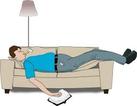1. LOOK FORWARD TO IT Insomniacs and bad sleepers dread the thought of going to bed. “Not another night of boring staying awake!” they moan. I was a member of this group for quite a while. The answer: turn it around. Make night time an exciting time, something to look forward to. How? My personal solution has been the discovery of the audio book. Nowadays I can’t wait to get into bed and turn on my mp3 player. Bedtime has become a joy. The thrill of the storyline unfolding dominates: no space for worry about not sleeping. Some people like to turn on a light and read; the great thing about the audio book alternative is that you can keep those little peepers closed. And even if it takes a while to waft off to dreamland, there’s the fun of fiction along the way. Interestingly, the more engaging the novel, the harder to stay awake. It’s important to choose a book that really grabs you and is outside your work zone or regular field of interest. Be adventurous. 2. RECONSIDER THE WORN-OUT APPROACHES Familiar with the conventional sleep-easy advice? The before-bed rituals of warm bath, warm drink, soothing music, dim lights, switched off screens, controlled environment, no stimulants or stimulation, visualising a peaceful place, don't think, plan or worry (that’s possible?). This approach certainly has its place but its downfall as well. The issue with pre-sleep rituals is that they can exacerbate our pre-sleep anxiety. We take these measures only when we’re worried about not sleeping. The worry drives us, disguised as sensible behaviour. Dr Guy Meadows, director of The Sleep School in London, http://www.thesleepschool.org/cautions that the ritual approach can provoke more anxiety than it alleviates. “Being reliant on unnatural night time rituals or props (e.g. warm baths, pills, alcohol) can fuel sleep anxiety and further sleeplessness. Gently let go of the props and follow a normal and regular wind down each night to retrain your brain to sleep.” When our conscious mind worries about sleeping it activates ancient, survival-related pathways in our brain which keep us wakeful. A vicious cycle ensues: short periods of sleeplessness caused by temporary factors spiral into a dread-fueled wakefulness that develops into clinical insomnia. 3. SLEEP WHEREVER, HOWEVER The usual picture of sleeping is to lie flat on a comfortable bed in a quiet bedroom. But Dr Meadows adds that many of his sleep clients “can spend the evening falling asleep in front of the television, but when they go to the bedroom, their hearts start racing.” So, if you fit this picture, why not sleep the whole night on the couch in front of the TV? It’s amazing where an insomniac can sleep when the conditions are right. At one point I repeatedly found myself lulled to sleep, in the middle of the day, by the beat of Eminem pumping from my teenage son’s bedroom ipod. Nowadays I sleep best when I nod off propped up in bed rather than lying flat. Weird? Tell me about it! 4. DON’T FREAK OUT IF YOU WAKE UP It made a huge difference psychologically when I heard that it’s normal for humans to wake up many times during the night. It’s part of the natural sleep cycle and ancient habit of checking for danger. However most of us get straight back to sleep without noticing. As insomnia took hold I’d gained the habit of freaking whenever I surfaced and would instantly be wide awake. These days I turn on my audio book, maybe dab some lavender oil on my wrist, and snooze off again. 5. A GOOD LAUGH A good belly-laugh works wonders for the nervous system, which in turn promotes a good night’s sleep. It resets the baseline parasympathetic chill-out mode and neutralises the culprit that keeps us awake: the ‘emergency’ sympathetic system that powers anxiety pathways. 6. THE MINDFULNESS APPROACH Training in mindfulness techniques such as Acceptance Commitment Therapy (ACT) supports every area of our life, waking and sleeping. My earlier post Hello Mind is an example. When it comes to sleep issues, embracing acceptance instead of struggle is invaluable. Dr Matthews includes ACT in his sleep-education kit, and instructs: “Welcome everything that shows up in your mind and your body. Buying into fearful thoughts or strong emotional reactions at night can keep you awake. Learning to change your relationship with them by getting to know them and even welcoming them when they arrive will reduce arousal levels and lessen your sleep struggle.” http://www.huffingtonpost.co.uk/dr-guy-meadows/how-to-sleep-well-every-night_b_4941759.html 7. LESSER-KNOWN PRE-BED RITUALS · Soak Your Feet In Warm Water for 10 minutes before bed · Take fish oil tablets on a daily basis (1000 mg a.m. and p.m.) · Chew the Schuessler Tissue Salt ‘Kali Phos’ nerve nutrient if you lie awake during the night. It’s great for worry or excitement. (No, I don’t work for the company, but everyone to whom I’ve recommended it agrees it's excellent.) On the conventional level, I have a personal penchant for lavender oil. Sometimes the warm drink before bedtime hits the spot. Here’s hoping my sleeping tips work for you. But if not, please don’t lose sleep over it. BONUS TIPS
Mindfulness techniques are excellent for reducing the hyper-arousal caused by underlying worry that keeps us awake. Checkout my other blog posts on the subject:- Manage your time online to avoid late sessions before bed. Manage Your Time Online (plus cute Timers for Kids). Hello Mind. Reduce anxiety with this wonderful practice from popular and respected Acceptance Commitment Therapy HELLO MIND: Cinderella's Circular Thoughts The standing desk. When your body has worked efficiently you are more thoroughly tired at the end of the day. TOSS THAT CHAIR: TAKE A STAND AGAINST SITTING Like it? Share it!
6 Comments
Sleepy friend
13/8/2014 10:44:52 am
Hey,more than 40 facebook likes for this post. Lots of random sleepers out there!
Reply
23/9/2017 06:39:37 am
These are some great tips, especially about the use of essence oil lavender on the wrists. I was also intrigued to read about our ability to check in at different times for danger.. it's amazing when you think about it what our bodies are capable of.
Reply
shakti burke
24/8/2021 11:05:15 am
Our bodies have so much wisdom!
Reply
shakti burke
24/8/2021 11:04:23 am
Thanks Dean
Reply
Leave a Reply. |
Categories
All
Categories
All
|
ServicesYoga Online
Mindfulness Coaching |
|






 RSS Feed
RSS Feed